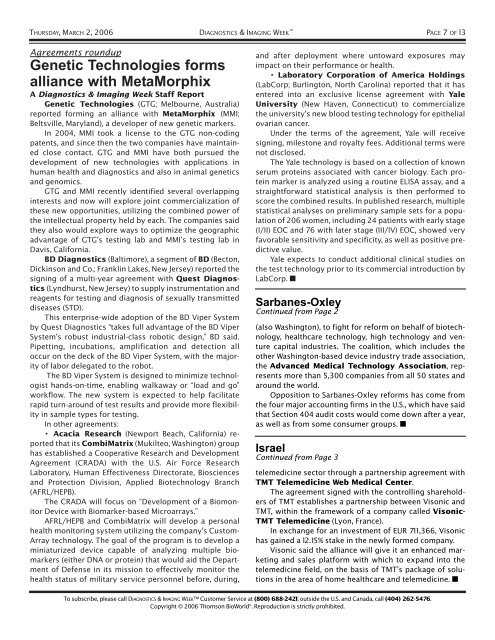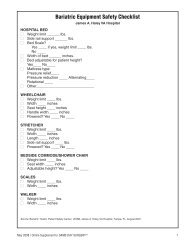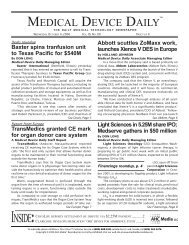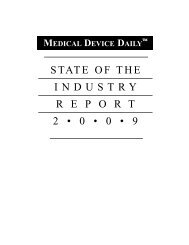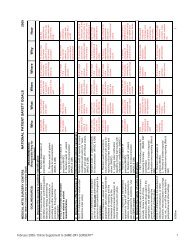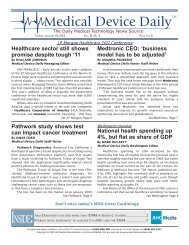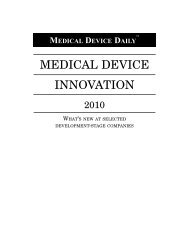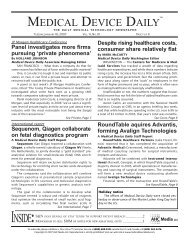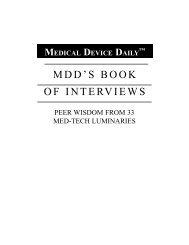THURSDAY, MARCH 2, 2006 DIAGNOSTICS &IMAGING WEEK PAGE 6 OF 13Deals roundupSchering in radiopharma sale;Legacy assets to CornerstoneA Diagnostics & Imaging Week Staff ReportSchering (Berlin) reported that its French subsidiary,Schering SAS, would transfer the radiopharmaceuticalbusiness of CIS bio international to a consortium formedby the Belgian companies Ion Beam Applications and theInstitut National des Radioelements. An agreement wassigned by the parties on last week.As part of the transaction, the consortium acquiresSchering’s current radiopharmaceutical business, whileSchering will continue to focus on the diagnostic fields ofMRI, computed tomography, and optical as well as molecularimaging.Closing of the transaction is expected in the first halfof 2006.About 750 employees in different countries will continueemployment under the ownership of the consortium.This divestment is part of Schering’s FOCUS initiativeand will contribute to further improve the company’s profitability,it said.The transaction will have a negative one-time effect ofabout EUR 50 million on Schering’s operating profit for fiscal2006.“We are highly committed to drive innovation in thefield of diagnostic imaging,” said Karin Dorrepaal, memberof the executive board of Schering responsible for itsDiagnostic Imaging business. “We realign our strategy inthe area of diagnostic imaging to focus on innovativegrowth opportunities and to increase our operating performancein this area at the same time.”MedMira (Halifax, Nova Scotia), a developer of rapiddiagnostic solutions, has closed on its acquisition ofSensorChem International (Toronto), which initially wasannounced in mid-December.Stephen Sham, chairman and CEO, said, “Our new division,Maple BioSciences, will focus on the commercializationof the breakthrough technologies developed bySensorChem, bringing to market a new product line and furtherstrengthening MedMira’s suite of diagnostic products.”MedMira has acquired all of the outstanding commonshares of SensorChem and retired $1,374,129 in that company’sdebt and preferred share interests, for a total considerationof $2,063,729. MedMira has issued 2,948,184common shares at a price of 70 cents a share, including409,973 common shares to a director of MedMira.Under the terms of the acquisition agreement, certainshareholders have agreed to trading restrictions where2,373,042 of the shares issued cannot be traded for 180 daysfrom the date of closing and 470,000 shares will be restrictedfrom trading for up to three years from the date of closing.MedMira said it is the leading global manufacturer of invitro flow-through rapid diagnostic tests, providing resultsin just three minutes for the detection of antibodies inhuman serum, plasma or whole blood for diseases such asHIV and hepatitis C.In other deal-related news:• Siemens <strong>Medical</strong> Solutions (Malvern, Pennsylvania),with its subsidiary PETNET Pharmaceuticals (Knoxville,Tennessee), reported acquiring New England PET-NET Manufacturing & Distribution Center (Woburn,Massachusetts), enabling the provision of biomarkers forclinical and pre-clinical positron emission tomography(PET) imaging to the New England region through PETNET’sSafetyNet international network of more than 45 manufacturingand distribution centers.Siemens bills PETNET as the world’s leading producerof PET biomarkers, with the largest U.S. network ofcyclotron-equipped radiopharmacies. Molecular imagingbiomarkers – small tracers that monitor biological processes– enable identification of the biological mechanismsof disease to determine personalized therapies.“PETNET customers in the New England region will haveaccess to an array of programs to support and enable thecontinuous development of their skills, productivity andtechnology,” said Michael Reitermann, president, MolecularImaging Division, Siemens <strong>Medical</strong> Solutions.A unit of Siemens (Erlangen, Germany), Siemens<strong>Medical</strong> operates in more than 120 countries and reportedsales of EUR 7.6 billion in 2005• CytoCore (formerly Molecular Diagnostics; Chicago)said it has entered into an agreement to purchase a contractfrom a private individual giving the holder the right toreceive a 10% undiluted interest in Diamics, a privatelyheld company founded by Peter Gombrich, former CEO andchairman of Molecular Diagnostics. Diamics was foundedwhile Gombrich was working at Molecular Diagnostics.CytoCore is developing the InPath cancer-screeningsystem for use in a laboratory or at the point of care toassist in the early detection of cervical, endometrial andother cancers. ■CourtContinued from Page 5The SEC amended its lawsuit against Scrushy threetimes after the case was put on hold pending the outcomeof a criminal fraud trial against him. Scrushy was acquittedof all charges in that case last June.In the SEC lawsuit, Scrushy’s lawyers had argued theSEC failed to justify its charges with enough evidence thatwould cause a reasonable person to have a strong inferencethat the HealthSouth founder was involved in theaccounting fraud. That fraud produced a false inflation ofthe organizations revenues by about $2.6 billion over theperiod 1996 to 2002.HealthSouth is one of the nation’s largest providers ofoutpatient surgery, diagnostic imaging and rehabilitativehealthcare services, operating facilities nationwide. ■To subscribe, please call DIAGNOSTICS &IMAGING WEEK Customer Service at (800) 688-2421; outside the U.S. and Canada, call (404) 262-5476.Copyright © 2006 Thomson BioWorld ® . Reproduction is strictly prohibited.
THURSDAY, MARCH 2, 2006 DIAGNOSTICS &IMAGING WEEK PAGE 7 OF 13Agreements roundupGenetic Technologies formsalliance with MetaMorphixA Diagnostics & Imaging Week Staff ReportGenetic Technologies (GTG; Melbourne, Australia)reported forming an alliance with MetaMorphix (MMI;Beltsville, Maryland), a developer of new genetic markers.In 2004, MMI took a license to the GTG non-codingpatents, and since then the two companies have maintainedclose contact. GTG and MMI have both pursued thedevelopment of new technologies with applications inhuman health and diagnostics and also in animal geneticsand genomics.GTG and MMI recently identified several overlappinginterests and now will explore joint commercialization ofthese new opportunities, utilizing the combined power ofthe intellectual property held by each. The companies saidthey also would explore ways to optimize the geographicadvantage of GTG’s testing lab and MMI’s testing lab inDavis, California.BD Diagnostics (Baltimore), a segment of BD (Becton,Dickinson and Co.; Franklin Lakes, New Jersey) reported thesigning of a multi-year agreement with Quest Diagnostics(Lyndhurst, New Jersey) to supply instrumentation andreagents for testing and diagnosis of sexually transmitteddiseases (STD).This enterprise-wide adoption of the BD Viper Systemby Quest Diagnostics “takes full advantage of the BD ViperSystem’s robust industrial-class robotic design,” BD said.Pipetting, incubations, amplification and detection alloccur on the deck of the BD Viper System, with the majorityof labor delegated to the robot.The BD Viper System is designed to minimize technologisthands-on-time, enabling walkaway or “load and go”workflow. The new system is expected to help facilitaterapid turn-around of test results and provide more flexibilityin sample types for testing.In other agreements:• Acacia Research (Newport Beach, California) reportedthat its CombiMatrix (Mukilteo, Washington) grouphas established a Cooperative Research and DevelopmentAgreement (CRADA) with the U.S. Air Force ResearchLaboratory, Human Effectiveness Directorate, Biosciencesand Protection Division, Applied Biotechnology Branch(AFRL/HEPB).The CRADA will focus on “Development of a Biomonitor<strong>Device</strong> with Biomarker-based Microarrays.”AFRL/HEPB and CombiMatrix will develop a personalhealth monitoring system utilizing the company’s Custom-Array technology. The goal of the program is to develop aminiaturized device capable of analyzing multiple biomarkers(either DNA or protein) that would aid the Departmentof Defense in its mission to effectively monitor thehealth status of military service personnel before, during,and after deployment where untoward exposures mayimpact on their performance or health.• Laboratory Corporation of America Holdings(LabCorp; Burlington, North Carolina) reported that it hasentered into an exclusive license agreement with YaleUniversity (New Haven, Connecticut) to commercializethe university’s new blood testing technology for epithelialovarian cancer.Under the terms of the agreement, Yale will receivesigning, milestone and royalty fees. Additional terms werenot disclosed.The Yale technology is based on a collection of knownserum proteins associated with cancer biology. Each proteinmarker is analyzed using a routine ELISA assay, and astraightforward statistical analysis is then performed toscore the combined results. In published research, multiplestatistical analyses on preliminary sample sets for a populationof 206 women, including 24 patients with early stage(I/II) EOC and 76 with later stage (III/IV) EOC, showed veryfavorable sensitivity and specificity, as well as positive predictivevalue.Yale expects to conduct additional clinical studies onthe test technology prior to its commercial introduction byLabCorp. ■Sarbanes-OxleyContinued from Page 2(also Washington), to fight for reform on behalf of biotechnology,healthcare technology, high technology and venturecapital industries. The coalition, which includes theother Washington-based device industry trade association,the Advanced <strong>Medical</strong> Technology Association, representsmore than 5,300 companies from all 50 states andaround the world.Opposition to Sarbanes-Oxley reforms has come fromthe four major accounting firms in the U.S., which have saidthat Section 404 audit costs would come down after a year,as well as from some consumer groups. ■IsraelContinued from Page 3telemedicine sector through a partnership agreement withTMT Telemedicine Web <strong>Medical</strong> Center.The agreement signed with the controlling shareholdersof TMT establishes a partnership between Visonic andTMT, within the framework of a company called Visonic-TMT Telemedicine (Lyon, France).In exchange for an investment of EUR 711,366, Visonichas gained a 12.15% stake in the newly formed company.Visonic said the alliance will give it an enhanced marketingand sales platform with which to expand into thetelemedicine field, on the basis of TMT’s package of solutionsin the area of home healthcare and telemedicine. ■To subscribe, please call DIAGNOSTICS &IMAGING WEEK Customer Service at (800) 688-2421; outside the U.S. and Canada, call (404) 262-5476.Copyright © 2006 Thomson BioWorld ® . Reproduction is strictly prohibited.
- Page 1 and 2: DIAGNOSTICS & IMAGING WEEKT HE W EE
- Page 3 and 4: THURSDAY, MARCH 2, 2006 DIAGNOSTICS
- Page 5: THURSDAY, MARCH 2, 2006 DIAGNOSTICS
- Page 9 and 10: THURSDAY, MARCH 2, 2006 DIAGNOSTICS
- Page 11 and 12: THURSDAY, MARCH 2, 2006 DIAGNOSTICS
- Page 13: THURSDAY, MARCH 2, 2006 DIAGNOSTICS


